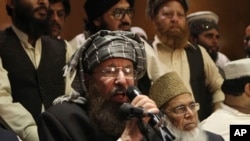ISLAMABAD —
Tentative peace talks between the Pakistan government and the Taliban stalled Tuesday, after militants killed a number of soldiers they had been holding.
Faced with continued militant attacks, Pakistan's government on Tuesday demanded that the Taliban agree to an unconditional ceasefire.
Irfan Siddiqui, coordinator of the government team leading the talks, made it clear that without an end to the violence, the already faltering talks could not continue.
"If there is a positive response to government calls for a cease-fire, or guarantees [of an end to the violence]," he said, " then we have no objection to seeing them."
Over the weekend, a Taliban fringe group executed 23 soldiers it had been holding hostage in the tribal northwest. Last week, militant bomb attacks killed at least 10 security forces in the southern city of Karachi.
Analyst and professor Rasul Baksh Rais said the government would likely continue to pursue the path of talks for the short-term.
But, he said continued attacks were eroding confidence in the success of a negotiated solution with the Taliban, and pressure was building within the powerful Pakistan armed forces for military action.
“I believe that while they [the government] might be assessing what would be the possible outcome of the dialogue with the Taliban, they must be preparing for military operations,” Rais said.
Maulana Yusuf Shah, a member of the committee nominated by the Taliban to represent the militants in the talks, said Tuesday that most militants were willing to consider a ceasefire.
"The Tehreek-e-Taliban has assured us that most of the groups are willing to agree to a ceasefire," he said, "and these groups are bound to obey any Taliban decision. He added that very few are against the ceasefire, and the Taliban are trying to win them over.
The Tehreek-e-Taliban is the umbrella group of a loose network of Islamist militants operating in Pakistan.
Analysts have noted the Taliban leadership does not fully control all its factions, leading to doubts on the effectiveness of a negotiated settlement.
Faced with continued militant attacks, Pakistan's government on Tuesday demanded that the Taliban agree to an unconditional ceasefire.
Irfan Siddiqui, coordinator of the government team leading the talks, made it clear that without an end to the violence, the already faltering talks could not continue.
"If there is a positive response to government calls for a cease-fire, or guarantees [of an end to the violence]," he said, " then we have no objection to seeing them."
Over the weekend, a Taliban fringe group executed 23 soldiers it had been holding hostage in the tribal northwest. Last week, militant bomb attacks killed at least 10 security forces in the southern city of Karachi.
Analyst and professor Rasul Baksh Rais said the government would likely continue to pursue the path of talks for the short-term.
But, he said continued attacks were eroding confidence in the success of a negotiated solution with the Taliban, and pressure was building within the powerful Pakistan armed forces for military action.
“I believe that while they [the government] might be assessing what would be the possible outcome of the dialogue with the Taliban, they must be preparing for military operations,” Rais said.
Maulana Yusuf Shah, a member of the committee nominated by the Taliban to represent the militants in the talks, said Tuesday that most militants were willing to consider a ceasefire.
"The Tehreek-e-Taliban has assured us that most of the groups are willing to agree to a ceasefire," he said, "and these groups are bound to obey any Taliban decision. He added that very few are against the ceasefire, and the Taliban are trying to win them over.
The Tehreek-e-Taliban is the umbrella group of a loose network of Islamist militants operating in Pakistan.
Analysts have noted the Taliban leadership does not fully control all its factions, leading to doubts on the effectiveness of a negotiated settlement.












